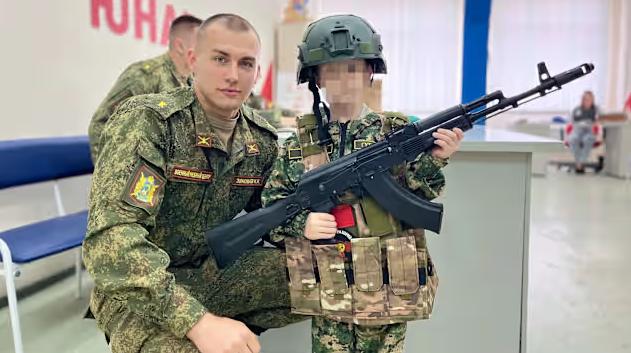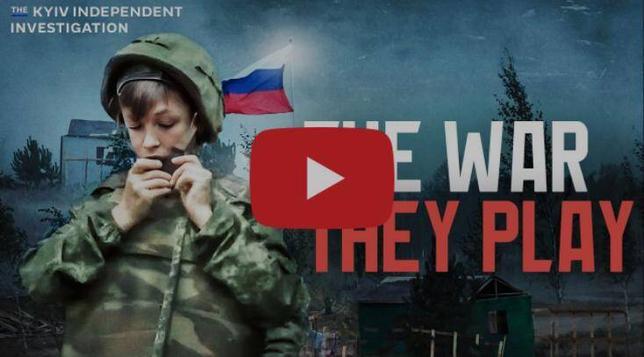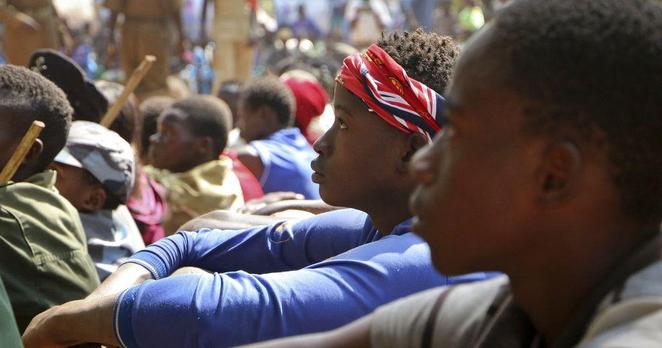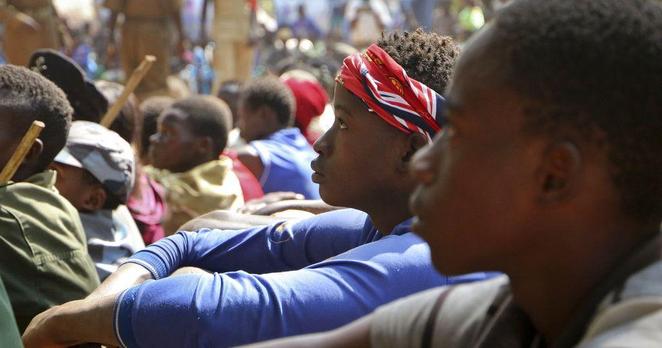The Everywhere Insiders 5: Geopolitical Fault Lines
Author(s): Scott Douglas Jacobsen
Publication (Outlet/Website): The Good Men Project
Publication Date (yyyy/mm/dd): 2025/07/01
Irina Tsukerman is a human rights and national security attorney based in New York and Connecticut. She earned her Bachelor of Arts in National and Intercultural Studies and Middle East Studies from Fordham University in 2006, followed by a Juris Doctor from Fordham University School of Law in 2009. She operates a boutique national security law practice. She serves as President of Scarab Rising, Inc., a media and security strategic advisory firm. Additionally, she is the Editor-in-Chief of The Washington Outsider, which focuses on foreign policy, geopolitics, security, and human rights. She is actively involved in several professional organizations, including the American Bar Association’s Energy, Environment, and Science and Technology Sections, where she holds the position of Program Vice Chair in the Oil and Gas Committee. She is also a member of the New York City Bar Association. She serves on the Middle East and North Africa Affairs Committee and affiliates with the Foreign and Comparative Law Committee. Tsukerman talks with Scott Douglas Jacobsen dissect Russia’s strategic bombing in Ukraine, its propaganda apparatus, and the West’s hesitant sanctions under Trump’s “two-week” deadline. The conversation then spans Indo-Pacific deterrence—British warships in the Taiwan Strait—and the pitfalls of unconditional ceasefires with Hamas and Iran, revealing critical gaps in modern geopolitical risk management.This interview was conducted on June 21, 2025.
Scott Douglas Jacobsen: Once more, we are here with the Everywhere Insiders, joined by New York attorney Irina Tsukerman. Today’s sources include the White House, Reuters, AP News, Human Rights Watch, Amnesty International, and the United Nations. A deadly drone strike has hit Kyiv. On June 17, 2025, a massive barrage of drones and missiles destroyed an apartment block in Kyiv, killing at least eighteen people and wounding over 150. As a footnote, I was there from August to September, and during that period, there was a significant attack in Poltava. We were there within a few hours. BBC’s team was there, Al Jazeera’s team was there—many media outlets covered it the same day.
I believe the final numbers for that strike were approximately fifty-nine killed and about 328 injured. One of the targets was a medical facility.
Irina Tsukerman: A few points must be emphasized. First, Russia is losing. A victorious military power does not need to rely on striking civilian infrastructure and non-combatants; it can achieve its objectives through territorial advances alone. Russia has made gains, indirectly aided by Trump’s foreign policy positions, but clearly not enough or quickly enough to secure decisive victories.
Moreover, after the operations, Spiderweb has lost much of its capacity to continue advancing. At some point, its gains will come to an end, and it is anticipating that by causing as much damage as possible in the meantime.
Second, we are now in week eight or nine of Trump’s so-called two-week deadline before he decides whether to sanction Russia over civilian casualties. After infamously asking what happened to Putin, Trump has since offered various excuses for Putin’s civilian attacks, claiming they are retaliation for so-called terrorism, and has done absolutely nothing to stop them by providing Ukraine with additional defensive capacity. He has done the opposite.
He has stated that he would halt assistance to Ukraine entirely and avoid taking any action against Russia. That is precisely what has happened since then. Of course, seeing that it effectively has a green light to keep targeting civilians, Russia will continue doing exactly that — because it is Russia. So yes, Donald Trump bears significant responsibility for these developments because his policies made them possible and have encouraged them in multiple ways, including by providing cover for Russia’s narratives.
I should also note that there are various propagandists for Russia who, no matter how vile their claims, are often labelled as working for other actors like Qatar. It is true that, in some cases, they serve multiple interests. However, many people are reluctant to directly attribute certain propaganda to Russian intelligence, even though it is obvious that some narratives originate there. Qatar has money but lacks Russia’s sophisticated narrative machinery.
So when you see people like Candace Owens and a few others, the fact is that at various points, they were amplified or supported by Russian interests — yet many people are afraid to say that outright. I do not know whether this is to avoid angering Trump or because they are deeply entangled with Russian propaganda networks by now. However, calling someone a Russian propagandist has become almost taboo in Washington circles.
Jacobsen: To your earlier point, Ukraine has managed to halt the Russian advance in Sumy. They announced that they had recaptured the village of Andriivka in the Sumy region, which had been the site of a major Russian offensive near the border. It involved the 220th Separate Assault Regiment. President Zelensky has called for stronger sanctions on Moscow and renewed pressure for peace talks.
Tsukerman: Well, obviously, Putin has shown little genuine interest in peace talks. What is even worse than Putin’s predictable posture is that Trump fled the G7 meeting before meeting with Zelensky — apparently out of fear of facing him. He cut the trip short and claimed he needed to handle an Iran issue, but that was just an excuse. He also tried to avoid President Macron, who was pressing him to take a clear position on Russia.
Trump’s response regarding Iran was to claim that Macron is always wrong about everything and is also wrong about Iran — which may or may not be true, but it had nothing to do with why Trump left the G7. Moreover, Trump has already announced that he will cut his NATO meeting in the Netherlands short, essentially because he does not want to deal with other world leaders.
Moreover, yes, one could say that he is supposedly in the middle of deciding whether or not to launch military strikes on Iran. However, given his recent record with Russia, I suspect we can expect more of the same with Iran as well. In other words, it is just an excuse to avoid awkward situations that would force him to answer for his completely failing policies.
Jacobsen: Two related updates: British warships recently transited the Taiwan Strait, allegedly. The Chinese military criticized the British passage as a deliberate provocation. Meanwhile, Taiwan is enhancing its maritime surveillance capabilities in response to the rising regional tensions. Taiwan has been sounding the alarm about the rise in Chinese military activity around the island, primarily involving warships and warplanes operating in the Pacific near its territorial waters. There were Coast Guard drills in Kaohsiung to demonstrate preparedness. What are your thoughts on the situation — the frigate passage, China’s response, and Taiwan’s countermeasures?
Tsukerman: The British action is only a provocation if you accept the premise that other countries are entitled to threaten their neighbours with the takeover and military force. If you do not accept that, then it is not a provocation at all — it is strategic deterrence and communication, which poses no real threat to China unless China itself intends aggression. If you are not planning to invade someone, there is nothing to be provoked by.
That said, the British have created this contradiction themselves. You cannot simultaneously maintain the “One China” policy and then act surprised when China asserts that Taiwan is part of its sovereign territory. At some point, you have to make up your mind: if you intend to stand with Taiwan, then you must formally recognize it as an independent country and treat it accordingly.
Otherwise, this so-called “strategic ambiguity” invites predictable aggression and allows China to advance its narrative unchallenged because no one is willing to take a clear stand. The same applies to the United States and other Western countries. If they want Taiwan to have the security guarantees and international standing of an independent state, then they must treat it as such.
You cannot have it both ways. This is precisely what China exploits — the fact that Western states want to have their cake and eat it too: maintain profitable trade relations with Beijing while simultaneously offering rhetorical support for Taiwan. That inconsistency undermines deterrence and emboldens China’s position.
Jacobsen: I wanted to follow up on that point. The formal policy for a long time has been, I believe, called the “One China” policy — or is it sometimes phrased as the “Two Chinas”?
Tsukerman: Well, officially, it is called the “One China” policy. Under this framework, most countries formally recognize Beijing as the legitimate government of China but maintain informal relations with Taiwan and treat it as an ally or partner in practice.
Jacobsen: But how can you defend Taiwan under international law if it is not formally recognized as an independent state? If it is considered a non-state actor, and then a state actor moves to take it over, what is the legal or diplomatic basis for stopping that claim?
Tsukerman: That is precisely the contradiction. If you are going to say that Taiwan is not a fully independent territory, then you leave open the door for China to justify its claims. That policy framework — the balancing act — has been in place since the 1970s, codified differently by each country but essentially consistent: diplomatic recognition of Beijing, with unofficial relations maintained with Taipei. Over time, it has only grown more contradictory.
Jacobsen: All right — this next one is more sensitive but also somewhat comical. Trump has now demanded that Iran agree to an unconditional surrender amid the ongoing Israel–Iran war. This has been unfolding between June 17 and June 20. Calls for airstrikes in both Israel and Iran have intensified. People can see that all over social media. As a side note, there is value in having this sort of high-speed, gossip-like global chatter, as it allows people to form rapid impressions. However, it still requires professional journalists and properly trained analysts to filter out the noise and present an accurate, concise, and factual narrative. So context is crucial — people see the missile footage but often do not understand the broader developments.
That is the first point. Then, according to AP, there has been no breakthrough in Europe’s diplomatic efforts to de-escalate the Israel–Iran conflict. They are calling it “Europe’s Geneva Initiative,” but so far, it has yielded no ceasefire agreement.
Tsukerman: It is typical of many European diplomatic pushes.
Jacobsen: What is the problem with the Western perception of this dynamic?
Tsukerman: First of all, two things can be true at the same time: no one should ever be tortured, and at the same time, just because someone has been tortured does not automatically make them a hero. Sometimes, regimes torture their people for political maneuvering or factional reasons — much like how Trump berates or fires his appointees when they fall out of favour.
Take Narges Mohammadi, for example. She began as a legitimate critic of the regime, but in the current context, she has, to some extent, been co-opted by the same regime in exchange for commuting part of her 32-year sentence. She recently issued a statement calling for peace — but without condemning the regime’s nuclear ambitions, its threats against other sovereign states, or acknowledging its fundamental lack of political legitimacy. So, yes — torture does not automatically confer moral infallibility.
Jacobsen: Fair point. Back to the main thread — so, no diplomatic breakthroughs. This one is grim: Human Rights Watch has reported that violations involving children in armed conflict are soaring. They documented over 26,000 verified grave violations against children in 2024 alone, including killings, abductions, and recruitment across various conflict zones. According to reports, this marks a record high, and Human Rights Watch has urged UN member states to enforce child protection measures and sanction those who violate them. That is a sensitive topic — do you have any thoughts on it?
Tsukerman: One of the most significant recent violators in this area is Russia. They have not only been training Russian-born children for conflict through militaristic school programs, but they have also been abducting Ukrainian children and indoctrinating them in school camps, essentially trying to turn them against their families and home communities.
Tsukerman: In this, they are following an Iranian model. Various Iranian proxies — Hezbollah, Houthis, Hamas — do precisely the same thing: abducting children of their adversaries, turning them into child soldiers, and then deploying them to terrorize or even murder their own families. It is an extensive process involving psychological breakdown and militant training.
I do not know whether these children can be fully deprogrammed — it likely depends on how young they were when taken, whether they have committed violence, and what stage of indoctrination they are in. I am not an expert on child soldier rehabilitation, but what I can say is that while there has been some attention to Russia abducting Ukrainian children, it is still not enough. Moreover, there is even less discussion about Russia using child soldiers more broadly — both their own and Ukrainian.
Russia is one of the major contributors to these grim statistics. Moreover, they are likely enabling or supporting other groups worldwide that use the same tactics. This is common — states or networks involved in human trafficking, narcotics, or other illicit activities often overlap and cooperate when it suits them.
So, if the international community truly wants to end child soldier recruitment, it must hold state actors accountable across the board. Yes, conflicts in Sudan, the DRC, or other parts of Africa may seem separate from the Russia–Ukraine war. However, you often find Russian military contractors or affiliates operating in those regions, too, enabling child abductions or recruitment because they do not view such practices as unacceptable. They facilitate whatever aligns with their strategic interests. If we want to stop this globally, we have to pursue accountability for all perpetrators everywhere.
Jacobsen: Agreed. We have two more topics. I need to expand the second one because something new has come up. Satellite imagery reportedly reveals the total razing of a town in Gaza. If confirmed, this would suggest potential war crimes, and there are calls for an independent investigation and accountability for those responsible. Thoughts?
Tsukerman: It is essential to be clear: this is not to say that Israel does nothing wrong — they have an internal investigative process and have held individuals accountable, including imprisoning personnel for violations during this war and previous escalations. So, I do not doubt that there will be consequences internally, regardless of external pressure.
That said, I take many of these reports with a large grain of salt. First, because many of these satellite-based reports are made without verifiable on-the-ground evidence, satellite images show destruction. However, they do not show who caused it, under what circumstances, or what combat activities took place before or during the damage.
They do not have direct access to what is happening on the ground. Satellite images taken from high altitudes can be manipulated or misinterpreted, and they often fail to tell the whole story. The reality usually involves Hamas deliberately planting explosives and constructing tunnels beneath entire neighbourhoods, making those areas effectively impregnable to any conventional clearing operation.
Sometimes buildings are destroyed not because there was an intentional strike to flatten them but because a hidden mine or booby trap is triggered inadvertently, setting off a chain reaction that demolishes everything above it. The entire area is rigged to explode — that is a deliberate tactic. This, in itself, is a war crime under international law.
The fact that Hamas has used this tactic systematically — not only in this conflict but in previous ones — means that any statements or media they release must be viewed through that lens. This is how they operate; it is a core part of their command structure and defence strategy.
I have yet to hear anyone propose a viable alternative for neutralizing this tactic without causing large-scale destruction. If everything is booby-trapped, the only way to avoid blowing it up is either to let Hamas remain entrenched or to reach the explosives before they are triggered — which is extremely difficult. So when people claim war crimes have occurred, they should also present practical methods for clearing such areas without detonations. I am sure Israel, the United States, and other stakeholders in the region would welcome workable alternatives; however, I have not seen a single credible plan so far.
Jacobsen: The UN Secretary-General, António Guterres, has appealed for an immediate, unconditional ceasefire to prevent further civilian suffering amid the escalating hostilities between Israel and Iran. There was also — if I recall correctly — a related resolution calling for an unconditional ceasefire between Israel and Gaza. Do you have any thoughts on either of these?
Tsukerman: No objections — that is fine. In any realistic scenario, an unconditional ceasefire would not be a good thing. An unconditional ceasefire with Hamas would mean that the remaining hostages would stay in Hamas’s hands and that Hamas would remain in power, free to regroup and attack civilians again — not only Israeli civilians but also its people.
An unconditional ceasefire with Iran means the regime gets to continue its nuclear program unchecked. If anything, the Secretary-General should be calling for an unconditional end to Iran’s nuclear program, unconditional access for international atomic watchdogs, an unconditional halt to threats against sovereign states, and an unconditional end to the regime’s oppression of its citizens. If he issued those demands, that would have real legitimacy.
Calling for an unconditional ceasefire, however, preserves the regime in its current form, legitimizing the activities that led to this escalation in the first place. It effectively tells the villain of the story that they get to survive and come back to fight another day because civilian suffering supposedly justifies it. However, civilians suffered before the conflict, they suffered during it, and they will continue to suffer if Israel withdraws. At the same time, the same regime remains in power — because this is what illegitimate regimes do: they make their people suffer.
Unfortunately, this also means that if bad actors learn that causing enough civilian suffering guarantees international calls to leave them alone, then every bad actor in the world will likely follow the same strategy. That cannot be allowed to happen. There must be real accountability. In this case, that means, at the very least, the degradation of Iran’s military and nuclear capabilities so it cannot threaten its neighbours — not just Israel, but the entire region — or export weapons elsewhere.
Second, the regime should not continue to enjoy political legitimacy when it came to power through violence and has maintained power through violence for the past forty-six years.
Jacobsen: Irina, thank you so much, as always. I will see you next week.
Tsukerman: Thank you. Yes, that sounds good — good luck and safe travels!
Last updated May 3, 2025. These terms govern all In Sight Publishing content—past, present, and future—and supersede any prior notices. In Sight Publishing by Scott Douglas Jacobsen is licensed under a Creative Commons BY‑NC‑ND 4.0; © In Sight Publishing by Scott Douglas Jacobsen 2012–Present. All trademarks, performances, databases & branding are owned by their rights holders; no use without permission. Unauthorized copying, modification, framing or public communication is prohibited. External links are not endorsed. Cookies & tracking require consent, and data processing complies with PIPEDA & GDPR; no data from children < 13 (COPPA). Content meets WCAG 2.1 AA under the Accessible Canada Act & is preserved in open archival formats with backups. Excerpts & links require full credit & hyperlink; limited quoting under fair-dealing & fair-use. All content is informational; no liability for errors or omissions: Feedback welcome, and verified errors corrected promptly. For permissions or DMCA notices, email: scott.jacobsen2025@gmail.com. Site use is governed by BC laws; content is “as‑is,” liability limited, users indemnify us; moral, performers’ & database sui generis rights reserved.
#ChildSoldiers #RussianPropaganda #TaiwanDeterrence #TrumpSanctions #UnconditionalCeasefire






